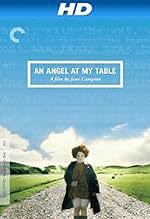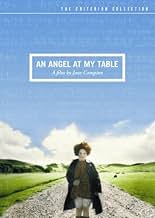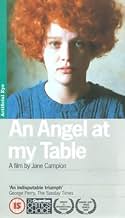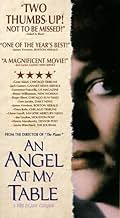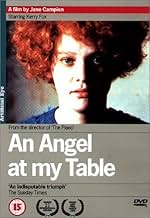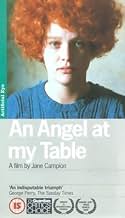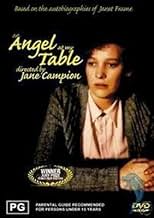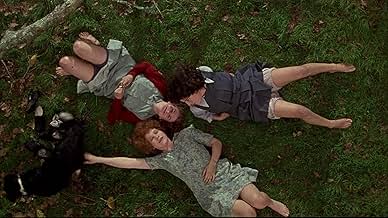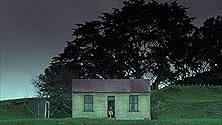CALIFICACIÓN DE IMDb
7.4/10
9.2 k
TU CALIFICACIÓN
Janet Frame era una niña brillante que, de adolescente, fue diagnosticada por error con esquizofrenia. Explora cómo Janet descubre el mundo y su vida en Europa a medida que sus libros se pub... Leer todoJanet Frame era una niña brillante que, de adolescente, fue diagnosticada por error con esquizofrenia. Explora cómo Janet descubre el mundo y su vida en Europa a medida que sus libros se publican con gran éxito.Janet Frame era una niña brillante que, de adolescente, fue diagnosticada por error con esquizofrenia. Explora cómo Janet descubre el mundo y su vida en Europa a medida que sus libros se publican con gran éxito.
- Dirección
- Guionistas
- Elenco
- Premios
- 19 premios ganados y 5 nominaciones en total
Kevin J. Wilson
- Father
- (as K.J. Wilson)
- Dirección
- Guionistas
- Todo el elenco y el equipo
- Producción, taquilla y más en IMDbPro
Opiniones destacadas
An Angel at My Table tells the story of famed New Zealand author Janet Frame. We are drawn into the quiet world of the shy, red-haired girl who struggles with her life, but succeeds through her exceptional talent of writing. Since her autobiography was written in three separate volumes, we are treated to a film in three separate parts, beginning with her journey through childhood. The film does an excellent job at portraying the character of Frame, and her nervous attitude when brought into social situations. Every ounce of shyness is felt off-screen, which is a kudos to the direction of Campion, that plays an important part in making sure that this woman is brought to life, as realistic, and as close to the truth as possible.
Growing up in poverty, with two hard-working parents, and 4 siblings, life must've been hard. But when you're thrust into such a difficult situation, it somehow seems normal and it doesn't bother that it's a much harder life than other people currently living are. But Janet lived through her childhood, finding that she would love to spend her life as a poet, or just writing. A depression hit her hard during her teenage years when an unexpected tragedy occurred, and she had chosen to write, instead of being with that person beforehand. Not knowing she was a depressed young person, Frame was sent to a mental hospital, and forced to undergo several shock treatments, under the incorrect diagnosis of schizophrenia. However, Frame persevered through it, using writing as a way of expressing her own thoughts. While still in the mental hospital, she was able to publish a book. The years inside the hospital are the most unpleasant of film, and Campion perfectly captures the deranged conditions that Janet experienced. The most remarkable part about the direction is how it doesn't go over the top to deliver a nauseating film in those scenes. Rather, she plays to the quiet personality of Frame. The film is kept with the same pace, and focused in a way that never wants to show itself off, but keeps the main character always in the center, without losing that focus.
The blown-up biopic `Malcolm X' was released around a year later, and while I admire that film, it was also very hyped-up before it's release. I found a strange drawing power in the fact that Jane Campion's film wasn't about spectacle, but about someone's life that is done more sincerely, and realistically, paying close attention to details, both period and human. Something you wouldn't find in a Hollywood biopic, such as Milos Foreman's `Man on the Moon,' which I openly despise.
The writer and director surprised me a bit concerning a small detail in the film. In films concerning `writing', and an exceptional author (Wonder Boys, Finding Forrester), there is never any real proof of how good the writer supposedly is. We are never allowed to read the great book they wrote, nor are there much of any excerpts written to prove to us that the writer is indeed as great as it is suggested. In films, I realize that it really isn't possible to show such a thing, since film is a visual medium instead of a literary one. Campion and the screenwriter know this, and without subjecting us to Frame's writing, she adds in some narration, using actress Kerry Fox's voice. The narration is spread out in small bits throughout the film, never taking control of telling the story. Instead, it conveys the thoughts going on in Frame's mind, which are all little excerpts from the writing contained in her autobiographies. It begins with narration and ends with it. A surprising detail that is small, but adds much to the overall film, and gives the ending a sweet, and optimistic touch to an amazing film.
Frame was (is) talented at what she did most of the time, without knowing the talent was there. She only knew that she loved to do it, and wanted to continue doing it for the rest of her life. That is true talent. She had it, even at times when she thought there wasn't any hope; she had the ability to write. And because of that ability, that talent, she was able to gradually come to terms, and live comfortably with her life. ****1/2 of five or (9/10)
Growing up in poverty, with two hard-working parents, and 4 siblings, life must've been hard. But when you're thrust into such a difficult situation, it somehow seems normal and it doesn't bother that it's a much harder life than other people currently living are. But Janet lived through her childhood, finding that she would love to spend her life as a poet, or just writing. A depression hit her hard during her teenage years when an unexpected tragedy occurred, and she had chosen to write, instead of being with that person beforehand. Not knowing she was a depressed young person, Frame was sent to a mental hospital, and forced to undergo several shock treatments, under the incorrect diagnosis of schizophrenia. However, Frame persevered through it, using writing as a way of expressing her own thoughts. While still in the mental hospital, she was able to publish a book. The years inside the hospital are the most unpleasant of film, and Campion perfectly captures the deranged conditions that Janet experienced. The most remarkable part about the direction is how it doesn't go over the top to deliver a nauseating film in those scenes. Rather, she plays to the quiet personality of Frame. The film is kept with the same pace, and focused in a way that never wants to show itself off, but keeps the main character always in the center, without losing that focus.
The blown-up biopic `Malcolm X' was released around a year later, and while I admire that film, it was also very hyped-up before it's release. I found a strange drawing power in the fact that Jane Campion's film wasn't about spectacle, but about someone's life that is done more sincerely, and realistically, paying close attention to details, both period and human. Something you wouldn't find in a Hollywood biopic, such as Milos Foreman's `Man on the Moon,' which I openly despise.
The writer and director surprised me a bit concerning a small detail in the film. In films concerning `writing', and an exceptional author (Wonder Boys, Finding Forrester), there is never any real proof of how good the writer supposedly is. We are never allowed to read the great book they wrote, nor are there much of any excerpts written to prove to us that the writer is indeed as great as it is suggested. In films, I realize that it really isn't possible to show such a thing, since film is a visual medium instead of a literary one. Campion and the screenwriter know this, and without subjecting us to Frame's writing, she adds in some narration, using actress Kerry Fox's voice. The narration is spread out in small bits throughout the film, never taking control of telling the story. Instead, it conveys the thoughts going on in Frame's mind, which are all little excerpts from the writing contained in her autobiographies. It begins with narration and ends with it. A surprising detail that is small, but adds much to the overall film, and gives the ending a sweet, and optimistic touch to an amazing film.
Frame was (is) talented at what she did most of the time, without knowing the talent was there. She only knew that she loved to do it, and wanted to continue doing it for the rest of her life. That is true talent. She had it, even at times when she thought there wasn't any hope; she had the ability to write. And because of that ability, that talent, she was able to gradually come to terms, and live comfortably with her life. ****1/2 of five or (9/10)
"An Angel at My Table" (1990) made by Jane Campion is a true life-story of Janet Frame (1924-2004), New Zealand's most famous author. The film starts with young Jane, a funny -looking red haired girl, shy and quiet who knew too well that she was "poor, smelly, and unpopular". Then it follows her to misdiagnosis of schizophrenia and more than 200 electroshock treatments in a mental hospital where she had spent eight years and a severe, lifelong shyness that was her only problem. Even in the hospital she was writing and was able to have her book published - writing did save her from losing her mind. The film is based on three of her memoirs, "To the Is-land", "An Angel at My Table" and "The Envoy from Mirror City".
Jane Campion made a very affecting and quietly powerful portrait of a writer who also was a gentle and genuinely humble woman. The film is never a sentimental manipulating story of a talented but misunderstood artist. It does not idealize Frame but it is a very honest and sympathetic portrait of an artist.
Jane Campion made a very affecting and quietly powerful portrait of a writer who also was a gentle and genuinely humble woman. The film is never a sentimental manipulating story of a talented but misunderstood artist. It does not idealize Frame but it is a very honest and sympathetic portrait of an artist.
"An Angel at My Table" (New Zealand, 1990): It's been three years since I've last watched this film. There is NO further reason to wonder if it should be in my "top" category. It is created by Jane Campion from the writer Janet Frame's autobiographies of her harrowing life. We join Janet during childhood, move through the teenage years and into adulthood, as she struggles for a place - ANY place - in the world...but deep down, writing is her one reliable love. Three actresses were needed for the role of Janet, and all do wonderful jobs, especially depicting someone who always feels on the outside, and longs to be included. Jane Campion, one of my favorite film makers, presents a powerful, subdued, and melancholy work of Art. It is not an amazing film due to every camera shot or the quality of sound recording
THIS work is great for its acting, and its story telling. It has as much emotion as one heart can hold for 157 minutes.
It's a biography of New Zealand author Janet Frame played by three different actresses over her life. She was born in 1924. Her large family is relatively poor. She's a chubby sensitive kid with big wild red hair. As a young teacher (Kerry Fox), she has an emotional breakdown and spends time in a mental hospital. She is diagnosed a schizophrenic. With her mother's approval, she is admitted to a mental hospital for over 8 years where she is subjected to 200 shock treatments barely escaping brain surgery.
This is an interesting portrait of a life. It isn't that dramatic except for the hospital section. It's more a series of events where a nervous Janet is belittled and overlooked. It doesn't fit the traditional three act play structure. It's a simple straight time line of events. Jane Campion uses her style of directing. It's natural and confident. A more standard biopic would concentrate on the 8 year hospital stay making a drama out of it. Instead, this way is a more humanistic way of showing a life. Kerry Fox is terrific and the little girl has an unforgettable look.
This is an interesting portrait of a life. It isn't that dramatic except for the hospital section. It's more a series of events where a nervous Janet is belittled and overlooked. It doesn't fit the traditional three act play structure. It's a simple straight time line of events. Jane Campion uses her style of directing. It's natural and confident. A more standard biopic would concentrate on the 8 year hospital stay making a drama out of it. Instead, this way is a more humanistic way of showing a life. Kerry Fox is terrific and the little girl has an unforgettable look.
Superficially, this is a sort of "My Brilliant Career," meets "A Beautiful Mind."
It features one of the most extraordinary actresses, new to me. I saw her in "Intmacy" and had to find more. It is made by a talented and sometimes engaging filmmaker who explores how women are haunted. It is about a writer whose books don't grab me, but whose story does. She believed herself haunted.
The problem is that these three songs from different souls don't overlap that much.
Frame created written images that were teased out of a struggle with life, one that infused her. Her sanity came from the writing. She didn't write about insanity and marginalization, she wrote from them to counter and co-opt them somewhat. This engages the reader because most of us are afraid to go as deeply into the darkness as these visions indicate.
That's a different thing entirely than the story Campion has chosen to give us, which is about all the external agency that surrounded her. I cannot think of an instance where the literary kite and the cinematic string are in such different dimensions. Sure, its an interesting story that someone's light survived, I suppose. But we never see that light, or the ledges that were climbed, or the images that were carried out for us.
What's left for Fox to do is emote visually. She does an extraordinary job, quite apart from the fact that it is ineffective in this container. I really do think she's something another of those Australian/New Zealand crowd that just seem to have something that is rare elsewhere.
She and the girls who play her younger selves are redheads. That's not at all a cinematic device, though it is used cleverly to mend the three actresses. Frame actually had that Clarabelle hair.
Ted's Evaluation -- 2 of 3: Has some interesting elements.
It features one of the most extraordinary actresses, new to me. I saw her in "Intmacy" and had to find more. It is made by a talented and sometimes engaging filmmaker who explores how women are haunted. It is about a writer whose books don't grab me, but whose story does. She believed herself haunted.
The problem is that these three songs from different souls don't overlap that much.
Frame created written images that were teased out of a struggle with life, one that infused her. Her sanity came from the writing. She didn't write about insanity and marginalization, she wrote from them to counter and co-opt them somewhat. This engages the reader because most of us are afraid to go as deeply into the darkness as these visions indicate.
That's a different thing entirely than the story Campion has chosen to give us, which is about all the external agency that surrounded her. I cannot think of an instance where the literary kite and the cinematic string are in such different dimensions. Sure, its an interesting story that someone's light survived, I suppose. But we never see that light, or the ledges that were climbed, or the images that were carried out for us.
What's left for Fox to do is emote visually. She does an extraordinary job, quite apart from the fact that it is ineffective in this container. I really do think she's something another of those Australian/New Zealand crowd that just seem to have something that is rare elsewhere.
She and the girls who play her younger selves are redheads. That's not at all a cinematic device, though it is used cleverly to mend the three actresses. Frame actually had that Clarabelle hair.
Ted's Evaluation -- 2 of 3: Has some interesting elements.
¿Sabías que…?
- ErroresThe streets of Ibiza have some features that surely were not present on the 50s, i.e., a "no parking" signal on one of the streets. Cars were very rare on the island those days.
- Bandas sonorasSomebody Stole My Gal
Written by Leo Wood
Performed by Pat McMinn with Crombie Murdoch and the Nickelodeons
Used by permission of D.F. Peach
Selecciones populares
Inicia sesión para calificar y agrega a la lista de videos para obtener recomendaciones personalizadas
- How long is An Angel at My Table?Con tecnología de Alexa
Detalles
- Fecha de lanzamiento
- Países de origen
- Idiomas
- También se conoce como
- An Angel at My Table
- Locaciones de filmación
- Productoras
- Ver más créditos de la compañía en IMDbPro
Taquilla
- Total en EE. UU. y Canadá
- USD 1,054,638
- Fin de semana de estreno en EE. UU. y Canadá
- USD 12,905
- 27 may 1991
- Total a nivel mundial
- USD 1,055,995
- Tiempo de ejecución
- 2h 38min(158 min)
- Color
- Relación de aspecto
- 1.66 : 1
Contribuir a esta página
Sugiere una edición o agrega el contenido que falta


